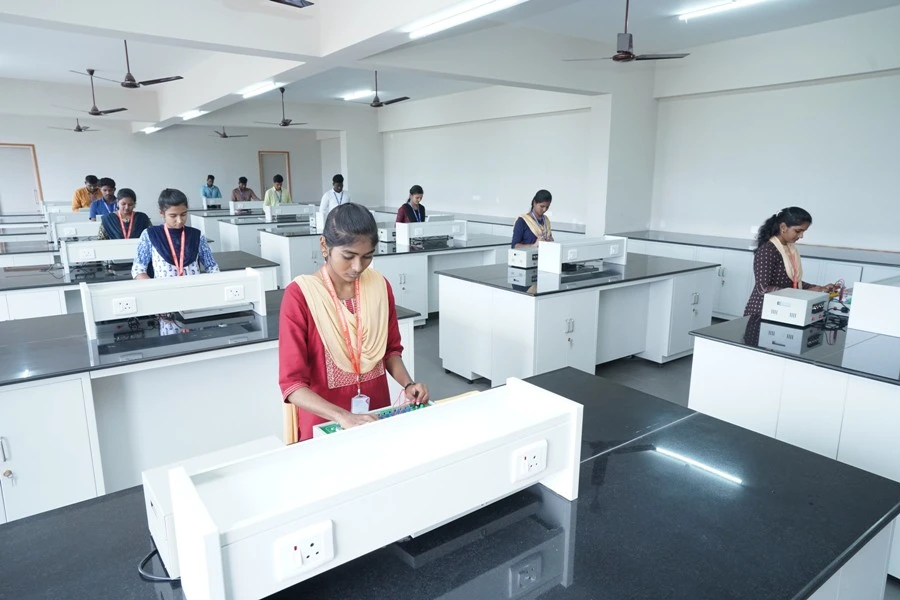Ph.D. in Electronics and Communication Engineering (ECE)
- Hands-on Training
- Faculty with International Experience
- Advanced Curriculum
- Upto 100% Scholarship based on merit

About the Course
The Ph.D. in Electronics and Communication Engineering (ECE) at Takshashila University is a research-driven programme designed for those passionate about advancing knowledge in the areas of electronics, communication systems, and signal processing. This programme provides you with the opportunity to explore cutting-edge topics, including wireless communication, semiconductor devices, embedded systems, and digital signal processing. Under the guidance of distinguished faculty, you will conduct innovative research, contribute to technological advancements, and apply your findings to address complex challenges in industries such as telecommunications, aerospace, and healthcare.
Course Curriculum

Year 1
The first year focuses on research methodology, critical analysis of existing literature, and building a solid foundation in electronics and communication engineering. You will learn about the latest trends in communication technologies and electronics, preparing you for in-depth research.
Key Subjects: Research Methodology, Advanced Electronics, Signal Processing, Communication Systems, Embedded Systems, Literature Review.
Year 2 and Beyond
In the subsequent years, you will focus on your chosen research area. You will conduct experiments, simulations, and analysis, contributing to publications and presenting your findings at conferences. You will also work on your thesis under the supervision of a faculty advisor.
Key Subjects: Research Work, Experimentation, Thesis Writing, Research Seminars, International Conferences, Publication of Research Papers, Dissertation Work.
Programme Outcomes (POEs)
Upon completing the Ph.D. in Electronics and Communication Engineering, you will have developed the following competencies:
Advanced Research Skills
You will acquire advanced research skills to identify significant challenges in electronics and communication and develop novel solutions to address them.
Specialisation in Electronics and Communication
You will gain deep expertise in your chosen area of specialisation, whether it’s wireless communication, semiconductor devices, or signal processing.
Critical Thinking and Problem-Solving
You will develop the ability to critically evaluate existing technologies, identify gaps in knowledge, and propose innovative solutions for the advancement of electronics and communication systems.
Scientific Writing and Publication
You will become proficient in scientific writing, preparing research papers for high-impact journals and presenting your findings at international conferences.
Collaboration in Multidisciplinary Research
You will be trained to work collaboratively with researchers from various fields, contributing to interdisciplinary projects that drive technological progress.
Leadership in Research and Development
You will develop leadership skills that prepare you to lead research teams, manage projects, and make significant contributions to the field of electronics and communication.
Programme Outcomes (POs)
The Ph.D. in Electronics and Communication Engineering will help you achieve the following broader learning outcomes:
PO1: Strong Foundation in Electronics and Communication
You will develop a solid foundation in the core principles of electronics and communication engineering, which will support your research in specialised areas.
PO2: Expertise in Advanced Electronics and Communication Technologies
You will gain in-depth knowledge of advanced communication technologies, embedded systems, and signal processing techniques, enabling you to design and optimise cutting-edge systems.
PO3: Analytical and Critical Research Skills
You will hone your ability to analyse complex research problems, develop solutions, and contribute to the scientific community.
PO4: Effective Collaboration and Communication
You will enhance your ability to work effectively in interdisciplinary research teams and communicate your ideas clearly to diverse audiences.
PO5: Advanced Problem-Solving in Communication Systems
You will develop the skills to tackle complex communication systems problems, designing systems that meet the needs of modern telecommunications.
PO6: Ethical Research Practices
You will adhere to ethical research practices, ensuring that your work respects privacy, confidentiality, and intellectual property.
Programme Specific Outcomes (PSOs)
Through this programme, you will develop the following specific competencies:
PSO1: Expertise in Communication System Design
You will gain advanced knowledge of designing communication systems, including both hardware and software components, ensuring they meet the latest industry standards.
PSO2: Signal Processing and Systems Analysis
You will become proficient in signal processing techniques, using them to improve the performance and efficiency of communication systems.
PSO3: Wireless Communication Systems
You will develop the ability to design and implement wireless communication systems, including mobile networks, satellite communication, and other advanced wireless technologies.
PSO4: Embedded Systems for Communication
You will acquire the skills needed to design embedded systems that integrate seamlessly with communication technologies, enabling efficient data processing and transmission.
PSO5: Advanced Research in Semiconductor Devices
You will specialise in the research and development of semiconductor devices, which are crucial components in modern communication systems and electronics.
PSO6: Network Security and Communication Protocols
You will learn to design secure communication networks and implement robust communication protocols to protect data integrity and confidentiality.
Career Scope
Graduates of the Ph.D. in Electronics and Communication Engineering will be well-equipped for a variety of roles in both academia and industry. Career opportunities include:
Research Scientist
- Role: Conduct cutting-edge research in electronics and communication engineering, developing new technologies and contributing to the advancement of the field.
- Salary: ₹12,00,000 to ₹25,00,000 per annum.
University Professor
- Role: Teach, mentor, and guide students in electronics and communication engineering, while continuing to contribute to academic research.
- Salary: ₹10,00,000 to ₹20,00,000 per annum.
R&D Engineer
- Role: Lead research and development efforts in tech companies, designing new communication systems and electronics technologies.
- Salary: ₹15,00,000 to ₹30,00,000 per annum.
Wireless Communication Engineer
- Role: Design and optimise wireless communication systems, including mobile and satellite networks, ensuring high-speed and reliable data transmission.
- Salary: ₹10,00,000 to ₹18,00,000 per annum.
Embedded Systems Developer
- Role: Develop embedded systems for communication devices, improving data transmission and system integration.
- Salary: ₹8,00,000 to ₹15,00,000 per annum.
Why TAKSHASHILA?

World-Class Research Facilities
Takshashila University is equipped with cutting-edge laboratories and research centres focused on electronics and communication engineering.
Experienced Faculty and Mentorship
Our faculty members are experts in their fields, providing expert guidance and mentorship throughout your Ph.D. journey.
Industry Collaboration
Our strong ties with leading research institutions and technology companies provide Ph.D. students with the opportunity to collaborate on high-impact research projects.
Global Recognition
The Ph.D. programme in Electronics and Communication Engineering at Takshashila University is internationally recognised, ensuring that your research makes an impact globally.

- Applicants must have completed their M.Tech or equivalent in Electronics and Communication Engineering, Electrical Engineering, or related disciplines with a minimum of 60% marks.
- A research proposal outlining your intended research area is required for application.
- Entrance exams or personal interviews may be required as part of the selection process.

For All Programmes except MBA, MCA, M.Tech, and Integrated Programmes offered by Sunstone, FacePrep, Kalvium and NxtWave
|
S.No |
% of Marks |
Scholarship Amount in Tuition Fees per year |
|
1 |
60% – 75% |
10% |
|
2 |
Above 75 % – 90 % |
25 % |
|
3 |
Above 90 % |
50 % |
Calculation of percentage of Marks (+2 of HSC / 2nd Year of APBIM or +2 of CBSE or Equivalent)
- Engineering – Average marks in Mathematics, Physics, Chemistry/Computer Science
- Lateral Entry – Average marks in Diploma Programme.
- Agriculture – Average marks in Physics, Chemistry, Biology / Botany &Zoology
- AHS / BPT / Pharmacy – Average marks in Physics, Chemistry, Biology / Botany &Zoology/Bio Tech
- UG – Arts & Science / Hotel Management – Overall +2 marks – (+2 of HSC / 2nd Year of APBIM or +2 of CBSE or Equivalent)
- PG – Overall % in UG
- Diploma – Average mark in 10th /Equivalent
MBA, MCA, M. Tech, and Integrated Programmes offered by Sunstone, FacePrep, Kalvium and NxtWave – No Academic Scholarship applicable.
Student Experience at Takshashila University
At Takshashila University, you will be part of a dynamic and supportive research environment, working on innovative projects in electronics and communication engineering. Our Ph.D. programme provides access to top-tier research resources and mentorship from leading experts.
What you can look forward to

Collaborative Research
Work with renowned faculty and industry partners on cutting-edge research projects in electronics and communication engineering.

Modern Research Facilities
Access state-of-the-art labs and equipment, enabling you to conduct high-quality research and experiments.

Networking Opportunities
Build connections with global experts, attend international conferences, and present your research to the scientific community.

Academic and Research Development
Receive continuous support from faculty and peers, contributing to your academic and professional growth as a researcher.
Spread over 150 acres
At Takshashila University, you will have ample opportunities to hone your skills in real-world healthcare settings, utilising state-of-the-art medical facilities and simulation labs on our 150-acre campus.
Start your journey towards becoming a leader in electronics and communication research today!
Frequently Asked Questions (FAQs)
Do I need to have a research proposal to apply?
Yes, a research proposal outlining your intended research area is required for the application process.
What career support is provided during the Ph.D. programme?
Takshashila University provides research collaboration opportunities, industry exposure, and career guidance to help you succeed in your post-Ph.D. career.
Is the Ph.D. programme internationally recognised?
Yes, the Ph.D. programme is recognised globally, ensuring that your research contributes to international advancements in electronics and communication engineering.









